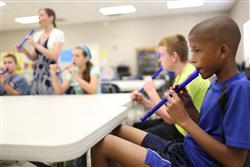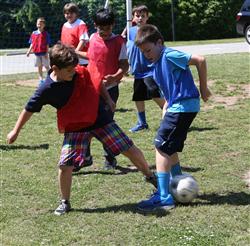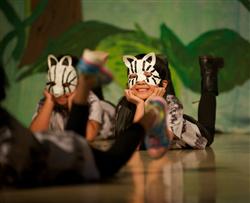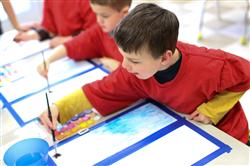By Kori Mackall, Director of Communications, The Piedmont School
Here at The Piedmont School, we know all about different learning styles. Some students are kinesthetic (hands-on) learners, some students are visual learners, some students learn best through music, and others learn best through active movement. Whatever the learning style, The Piedmont School is a firm believer that education and its delivery are not “one size fits all”. Of course academics are the core of a solid and successful education, but we also know that every child needs a creative outlet to help their cognitive, social, and emotional development. With this in mind, we are firm believers in a complete and integrated Arts education. The Arts are too regularly an underfunded portion of the education curriculum that is often first on the chopping block as the push for STEM education and other math and science based programs come to the foreground. While we don’t argue the value of solid and strategic academic programs, as educators and child development specialists we know first hand the importance a balanced education plays into the social, academic, and emotional growth of children. The Arts, for many students, are pivotal in this growth.
 Just a simple search engine search for “Arts education” one can find a lot of research out there that has been done showing the increasing reading, writing, and math competencies of students who are exposed to music, dance, drama, and art. There have been studies showing direct links between Arts education and improved literacy, increased graduation rates, higher attendance, and even increased test scores. A study completed byJohns Hopkins University found students who were motivated to practice a specific art form and spent time with focused attention improved their overall attention span as well as increasing their overall fluid IQ scores.
Just a simple search engine search for “Arts education” one can find a lot of research out there that has been done showing the increasing reading, writing, and math competencies of students who are exposed to music, dance, drama, and art. There have been studies showing direct links between Arts education and improved literacy, increased graduation rates, higher attendance, and even increased test scores. A study completed byJohns Hopkins University found students who were motivated to practice a specific art form and spent time with focused attention improved their overall attention span as well as increasing their overall fluid IQ scores.
 At The Piedmont School, we serve a unique population of students. A Piedmont School Panther is a bright student with average or above cognitive abilities but struggles with learning differences such as ADHD, processing disorders, or subject specific learning discrepancies. These students often struggle so greatly in their academic lives that it is often easy for them to feel unsuccessful more than they feel accomplished. We have found that the key to helping our students thrive comes from a balanced education and a daily schedule that touches on multiple learning styles so that we can ensure each child is learning to their style each day. Through an integrated Arts program our students are able to learn through movement, music, visual and artistic expression on a daily basis. Students participate in the visual and performing arts several times a week. Students have a formal Art class twice a week where they build, create, draw, sculpt, paint, and innovate. Students also have Drama twice a week where they are able to learn how to express themselves, better communicate, and learn about theatre and acting. Our students also participate in our collaboration with the North Carolina Music Academy with a weekly music class where they learn about pitch, tone, singing, reading music, and instruments. While athletics are not considered part of an Arts curriculum, at TPS we place a heavy focus on physical activity and our students have a formal Physical Education class every day. We have found a similar benefit for our students with daily physical activity and movement as we have from the daily exposure to an Arts education.
At The Piedmont School, we serve a unique population of students. A Piedmont School Panther is a bright student with average or above cognitive abilities but struggles with learning differences such as ADHD, processing disorders, or subject specific learning discrepancies. These students often struggle so greatly in their academic lives that it is often easy for them to feel unsuccessful more than they feel accomplished. We have found that the key to helping our students thrive comes from a balanced education and a daily schedule that touches on multiple learning styles so that we can ensure each child is learning to their style each day. Through an integrated Arts program our students are able to learn through movement, music, visual and artistic expression on a daily basis. Students participate in the visual and performing arts several times a week. Students have a formal Art class twice a week where they build, create, draw, sculpt, paint, and innovate. Students also have Drama twice a week where they are able to learn how to express themselves, better communicate, and learn about theatre and acting. Our students also participate in our collaboration with the North Carolina Music Academy with a weekly music class where they learn about pitch, tone, singing, reading music, and instruments. While athletics are not considered part of an Arts curriculum, at TPS we place a heavy focus on physical activity and our students have a formal Physical Education class every day. We have found a similar benefit for our students with daily physical activity and movement as we have from the daily exposure to an Arts education.
 In addition to our Arts program, we have found great value in integrating techniques and activities from these classes into our academics programs. Walking around our school you will often see a reading class creating visual works of art to communicate themes in novels they are reading, you’ll see students acting out scenes from stories they are reading, you’ll hear songs about days of the week and multiplication facts, you’ll see students creating digital works of art and photography projects on computers, and you’ll see physical activity throughout every class. Rarely will you see a full lesson that consists of students sitting in a desk for forty-five minutes to an hour listening to a lecture by their teacher. You’ll see movement, you’ll see interaction, you’ll see art, music, theatre, and most of all you’ll see engagement. Just like a well-balanced meal, a well-balanced education will help our students grow cognitively, emotionally and socially to become stronger and more successful. We always hear the importance of having a healthy balance in our diets, but we also need to remember a balance in our child’s education.
In addition to our Arts program, we have found great value in integrating techniques and activities from these classes into our academics programs. Walking around our school you will often see a reading class creating visual works of art to communicate themes in novels they are reading, you’ll see students acting out scenes from stories they are reading, you’ll hear songs about days of the week and multiplication facts, you’ll see students creating digital works of art and photography projects on computers, and you’ll see physical activity throughout every class. Rarely will you see a full lesson that consists of students sitting in a desk for forty-five minutes to an hour listening to a lecture by their teacher. You’ll see movement, you’ll see interaction, you’ll see art, music, theatre, and most of all you’ll see engagement. Just like a well-balanced meal, a well-balanced education will help our students grow cognitively, emotionally and socially to become stronger and more successful. We always hear the importance of having a healthy balance in our diets, but we also need to remember a balance in our child’s education.
We invite you to come take a tour of our campus to see all the great things that are happening at The Piedmont School. To schedule a tour contact Tim Montgomery, Head of School, at (336) 883-0992 or by email attmontgomery@thepiedmontschool.com.
*Sponsored by The Piedmont School
















